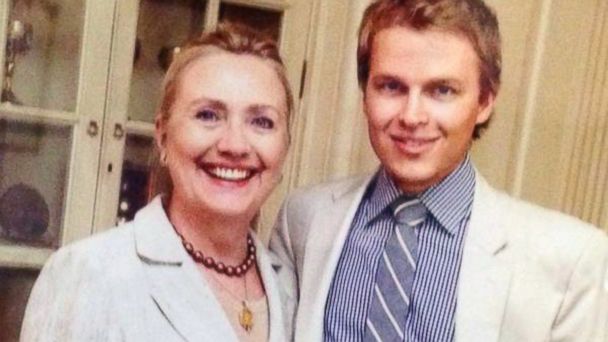Hillary Clinton's Youth Office Gets New Home, But Will It Get Lost?

Ronan Farrow posted this photo with then Secretary of State Hillary Clinton to his Twitter, Dec. 31, 2012. @RonanFarrow/Twitter.
A State Department office created by former Secretary of State Hillary Clinton that she touted as a direct channel to young people around the world is undergoing bureaucratic changes that could lead to the elevation of its mission - or, one veteran of government red tape warned, its eventual demise.
Founded in 2011 under the leadership of Special Adviser Ronan Farrow, now an MSNBC host, the Office of Global Youth Issues was established to change the way America engages with people under 30 around the world, Farrow said in an email to ABC News.
As special advisers, Farrow and his successor Zeenat Rahman reported directly to the Secretary of State, first Clinton and then John Kerry - unlike the structure of more permanent bureaus at the State Department, which are led by undersecretaries who focus on a particular issue or part of the world.
But beginning in mid-summer, the Global Youth Issues office will become part of the Bureau of Public Diplomacy and Public Affairs, headed by newly sworn-in Undersecretary Richard Stengel. Rahman, the current special adviser, said the change will happen in mid-summer.
The reason, said Assistant Secretary of State for Public Affairs Douglas Frantz, is that it can be hard for special advisors' offices, which report directly to the top leaders at Foggy Bottom, to carry the institutional heft to survive at the State Department long-term.
That's despite the heavy praise Clinton levied on the office while she was Secretary, dispatching Farrow to speak with young people around the world and praising him as "a young 24-year-old activist… who is our adviser on global youth issues," as she did in February 2012 at a town hall in Tunisia.
It can be hard for someone in a special advisory role to maintain the secretary's attention on a subject as broad as "youth issues," Frantz said. "When you have these special offices, they do tend to get orphaned. It's tough to integrate it into the larger message."
Rahman said she will stay through the transition and help pick her successor.
"The fact that this is getting institutionalized and is going to have a life and legs beyond my tenure here, that was always the wish," Rahman said.
She mentioned among the office's chief successes the establishment of almost eighty "youth councils" around the world, which serve as steering committees of sorts within embassies, and provide input on local issues.
Both Rahman and Farrow expressed optimism that Stengel would treat youth issues as a central part of his mission.
"Rick Stengel is one of the big champions of this work, and he's seen how it's yielding results," Farrow said. "I've kept in touch with him about this and I have a lot of confidence in his ability to marshal new resources and support for it. I think it's a smart move."
But Gordon Adams, who from 1994 to 1997 was the senior White House official for national security and foreign policy budgets, warned that such bureaucratic shuffles sometimes lead to a small office becoming obsolete.
"Moving an office, especially an office, can result in its death over time," Adams said in an email.
For example, Adams noted the position of U.S. representative to the Korean Peninsula Energy Development Organization (KEDO), a multinational group founded in 1994 to implement President Bill Clinton's framework for economic cooperation and peace with North Korea. The mission for that particular organization - and the role of the US representative to it - all but expired by 2006.
Adams also predicted that the Office of the Special Representative for Afghanistan and Pakistan, founded by the late diplomat Richard Holbrooke, would eventually get folded back into the Near Eastern Affairs bureau.
"Regional bureaus like to absorb these things back into their responsibilities; they usually resent them being pulled out and reporting directly to the Secretary," he said.
But Rahman rejected the idea that the Global Youth Issues office - currently comprised of her and two staffers - would lose its voice as part of the Public Diplomacy bureau.
"I'm not worried about that at all. If you think about what foreign policy looks like in the 21 st century, we have to do this," she said.
In a statement to ABC, Stengel seemed to agree with Rahman.
"Secretary Kerry believes in the importance of reaching out to youth and this change only ratifies that," he said. "I am excited to build on the advances in youth policy and youth engagement over the last few years and am intent on elevating and expanding our reach with an emerging generation of future - and present - leaders."
Adams acknowledged that even though sometimes offices get strangled by red tape when they enter a State Department bureau, it's ultimately that bureau's leader who has the final say in a new office's prominence, or lack thereof.
"If the transfer was designed to make that topic more central as party of public diplomacy, [i.e.,] integrate it with social media, it could be a 'promotion,' rather than death," he said.